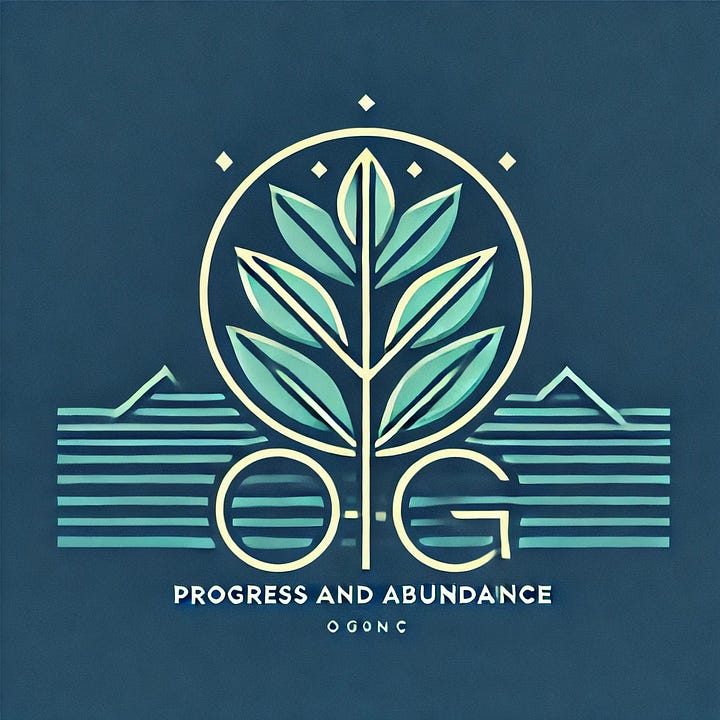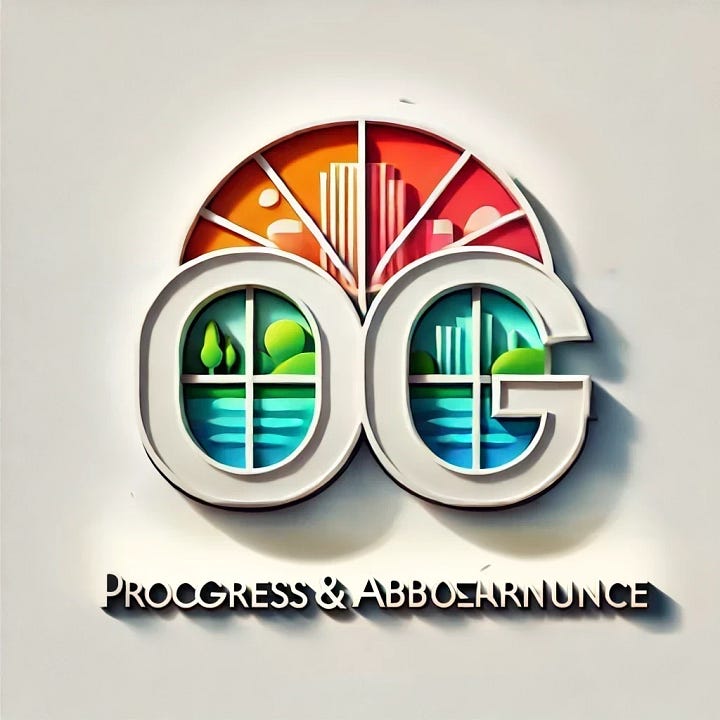Abundance, Progress, and the Future of American Politics
Zero-sum rhetoric may thrill "the base," but both parties have factions that offer something better.

As a Never Trumper, I find myself strangely hopeful—not optimistic, but hopeful—about the election results. For starters, while the race was close, the results were unambiguous, saving the country the trauma of court cases, lawfare, riots, and further civic unraveling. Unable to tell themselves that Trump didn’t really win, serious Democrats are opting for normal post-election self-examination rather than Resistance and Russia-blaming. And, of course, since Trump won, he and his followers won’t be attacking Capitol Hill this time around.
The primary source of my hope lies elsewhere. I spent October immersed in the growing intellectual and political movement in favor of progress and abundance. People of both parties and none—and non-Americans like my U.K. friends at Works in Progress and the European ecomodernists at WePlanet—are working to counter today’s widespread cynicism, discontentment, and frustration with ideas that emphasize innovation, growth, and an expansive future. Instead of preaching zero-sum politics, where the difference between parties lies the targets they choose to demonize, they emphasize creating a widespread sense that life is getting better.
Their greatest successes so far have been in the YIMBY movement to lower the barriers to building housing, although there’s still lots to do in that arena. On a panel at the Abundance 2024 conference, I pointed out that Kamala Harris was promising to get 3 million homes built in four years, which sounded like a bold increase. But after World War II, when the population was much smaller and the country much poorer, we built more than 1 million housing units a year. There’s no economic or technological reason we couldn’t build many more than that today. The problem is regulatory, which is to say self-inflicted.
The sheer number of new progress and abundance organizations, many with similar names, can be bewildering. (Ron Bailey published a good survey of the movement in Reason.) Those who lean left tend to talk about “abundance” and those who lean right about “progress,” but they’re mostly allies. In many ways the movement reminds me of the cross-party search for new policy ideas in the late 1970s—a process that gave us airline and trucking deregulation, the earned income tax credit, and a Reagan administration FTC that focused on expanding consumer choice.1 For someone who’s been called the “Progress OG” by more than one person, this intellectual and political ferment is enormously cheering.




I’m hopeful that this election will strengthen the progress and abundance factions in both parties. (This podcast conversation with Steve Teles, which was held before the election, discussed party factions.)
I see Trump as zero-sum thinker whose interest in abundance extends only to those he sees as his people. He wants give the right people bigger slices of a fixed pie. His dark messages about trade and immigration repudiate the progress and abundance ethos, big time. They even contradict his self-proclaimed goals since, for instance, American manufacturers often need foreign materials. Most depressingly, since it cuts against his bragging rights about Operation Warp Speed, he has brought in RFKJr. to spread anti-vaccine nonsense.2 Trump is not part of the GOP’s progress faction.
But—and this is a huge but—Trump’s supporters are another matter. They include many people who are drawn to Trump’s image as an entrepreneur and builder. They are rightly frustrated with the many technocratic impediments to getting things done, whether erecting a small apartment building or building nuclear energy plants. They’re fed up with ignorant “experts” looking down on them, dictating how they should behave, and using legal power to squelch not only their activities but their speech. This pre-election Instapundit post nicely illustrates their “just blow things up” attitude, as does Marc Andreessen’s Twitter stream. Too often government only seems to work against its citizens, not for them. Trump promises change. And he seems less likely to block promising new businesses and technologies.
Dean Ball, whom I featured on my first podcast, is hopeful about what a Trump administration portends for AI regulation:
The Biden administration represents (hopefully) the high water mark of what I call “everything is everything” liberalism, and what New York Times columnist Ezra Klein calls “Everything-Bagel” liberalism. This is a political approach that sees every government action as an opportunity to advance nearly every cultural and political priority the administration has. How could we ever just aim to build semiconductors—the most complex physical items ever conceived by man—in American factories, this line of reasoning goes, when there is climate change to defeat and systemic racism to contend with and union jobs to create? No problem can be assessed on its own, and no solution can be pursued independent of all the other problems facing the world. Everything, after all, is everything….
The “everything is everything” approach has characterized the Biden administration’s AI policy since the beginning. With this approach, no measured, technically focused prioritization is possible.
Matthew Mittelsteadt, who dug up the perfect 1921 political cartoon as an illustration, sounds a cautionary note. The across-the-board tariffs Trump promises could kneecap American AI. The entire post is worth reading, but here’s the relevant passage:
In a September 2024 report, UBS, an investment banker, predicted both tech hardware and semiconductors to be among the top four sectors that would be hardest hit by a general tariff. Their analysis is spot on. Many of the hardware components that make AI and digital tech possible rely on imported materials not found or manufactured in the United States. Neither arsenic nor gallium arsenide, used to manufacture a range of chip components, have been produced in the United States since 1985. Legally, arsenic derived compounds are a hazardous material, and their manufacture is thus restricted under the Clean Air Act. Cobalt, meanwhile, is produced by only one mine in the U.S. (80 percent of all cobalt is produced in China). While general tariffs carry the well-meaning intent of catalyzing and supporting domestic manufacturing, in many critical instances involving minerals, that isn’t possible, due to existing regulations and limited supply. Many key materials for AI manufacture must be imported, and tariffs on those imports will simply act as a sustained squeeze on the tech sector’s profit margins.
I expect to see plenty of internal conflict over priorities during and after the transition to the Trump administration.
As for the Democrats, I encourage everyone, regardless of affiliation, to read Jen Pahlka’s powerful, impassioned election postmortem. Jen is a Democrat who comes out of tech, specializing in user interactions. Her work turns the philosophical idea of “state capacity” into real-life improvements in such mundane things as the interfaces for veterans claiming their benefits online. She is spitting mad at her fellow Dems. From her post:
I’m no expert in polling or voter sentiment or messaging or even how poor people feel, but I do know a thing about why it’s taken two years to get half the CHIPS Act money awarded, why the green energy infrastructure the IRA promised is stuck in years- or decades-long permitting processes and will probably come too late to avoid climate collapse, why so much promised Covid relief went to criminals instead of the needy, why so many kids applying for college couldn’t get financial aid last year. If you think my answer is that we need better technology, you are looking at the cover of my book without reading it. It is not technology. It is caring about outcomes instead of intentions, it is seeing things through instead of declaring victory and then bludgeoning the public with reasons they should celebrate you. It is listening --- did it help? Is this working? Don’t show me the study that says the ceiling is fixed while the leak is dripping on my head.
Here's the other thing I’m just going to say and live with the consequences of. I have no delusions that Elon Musk or anyone else in a Trump administration wants anything to do with me (though Megan McArdle helpfully suggested they should). I’m on record with my views. But it seems the sledgehammers are coming for government, and if I were asked where to aim them, I would answer. Not Schedule F, please, but yes, take our civil service system down the studs so that we can rebuild it. The guiding principles are correct, but the operational structures that've been built atop them don’t work, and they need to. Not mass layoffs and contracting the work to cronies, but, yes, right-size the stop energy and bring in the go energy so we can get stuff done. Don’t get rid of all guardrails and let government run wild, but yes, pull back on processes that no longer serve us, that turn what so much of what civil servants must do and what taxpayers foot the bill for into bullshit jobs. And stop pretending those mountains of procedures protect the vulnerable. In practice, paperwork favors the powerful. If I could redirect the sledgehammers in the right direction even a bit, I’d engage.
On Twitter someone asked Colorado Governor Jared Polis, a Democrat, to explain this map, showing his state trending blue while most of the country was trending red. He replied:
Prosperity and abundance agenda. We have focused on saving people money through three income tax rate reductions (two at the ballot box and one through the leg: 4.63%>4.5%>4.4%>4.25%), cutting property taxes, free preschool and kindergarten for every child, eliminating sales tax on necessities like diapers and feminine hygiene products, and we are in the process of delivering on pro-housing supply solutions, investing in transit and transit-enhanced living opportunities… all while protecting and expanding personal freedom and respect for everyone.
That’s the kind of platform either party could run on and win.
Check out this Bloomberg article (no paywall) by Joel Millman on Latinos working in the Dalton, Georgia, carpet industry. If you remember the discussion of Cambodian-owned doughnut shops in The Future and Its Enemies, Millman’s reporting for the WSJ was the source.
Speaking of The Future and Its Enemies, I’ve been revisiting both the book and some of the articles that led to it as part of my progress-and-abundance immersion. I’ll be posting a few over the next few days. You can also read chapter six, on nature, in four parts here on Substack: Part I, Part II, Part III, Part IV.
The Roots of Progress conference I attended in October got many enthusiastic writeups. Some were essentially reviews but many were essays expanding on ideas sparked by the conference Some of the best include Zachary Karabell’s (“Twelve hours each day, countless side conversations and panels and discussions, and I didn’t hear the words ‘Trump, Harris, Israel or Gaza.’ Not one.”), Benjamin Parry’s (“if Progress Studies has managed to find its footing with a shared set of cares, concerns, and approaches then that is perhaps a much greater success than if it had simply arrived at a particular orthodoxy about what produces progress.”), Packy McCormick’s (“people are building companies based on ideas from the 1950s and 1960s.”), and Sarah Constantin’s (“Within the range of the kinds of work I care about (roughly, advancing science and technology & their applications to human benefit), there’s a ‘radical/moderate’ spectrum and a ‘small/large” spectrum.’) Lynne Kiesling kindly gave a shoutout to The Future and Its Enemies.
My particular favorite FTC policy, which endured and expanded, was requirement that eye doctors give patients copies of their prescriptions and that states and professional associations allow advertising the prices of eyeglasses. The resulting competition increased choice and convenience and decreased prices.
It’s not that I think this is Trump’s worst action. His dehumanizing rhetoric about immigrants is much worse. But undermining his own accomplishments is extraordinary for such a self-involved man, making the anti-progress turn all the more blatant.




I recommend that you use Ideogram for creating images with text - and always put the text that you want into quotation marks "Progress and Abundance" https://ideogram.ai/t/explore This is the resource I suggest to students and businesses.
Interesting article about your interpretation of the 2024 election results from a Progress perspective. While we are not very influential within either party, I think the Progress movement can have far more success via the Republican Party than the Democratic Party. Far too many necessary reforms would attack sacred sows within the Democratic Party and I just do not see them changing. The Republicans are not pro-Progress, but they are not anti-Progress as so many Democrats are.
And I say that as a former Democrat who once ran for state-level office under the party banner. I go into more detail in this article:
https://frompovertytoprogress.substack.com/p/why-the-left-undermines-progress
You probably do not know me, but I have been a member of the Progress Studies movement for a number of years and have written two books on the subject. Unfortunately, I was not able to attend the conference and meet you.
You might be interested in series of posts that I wrote on what I believe Progress studies is and how we can make the biggest possible impact on society.
https://frompovertytoprogress.substack.com/p/what-is-progress-studies
Since I have a strong background in politics, I also have thoughts on how the Progress party can organize.